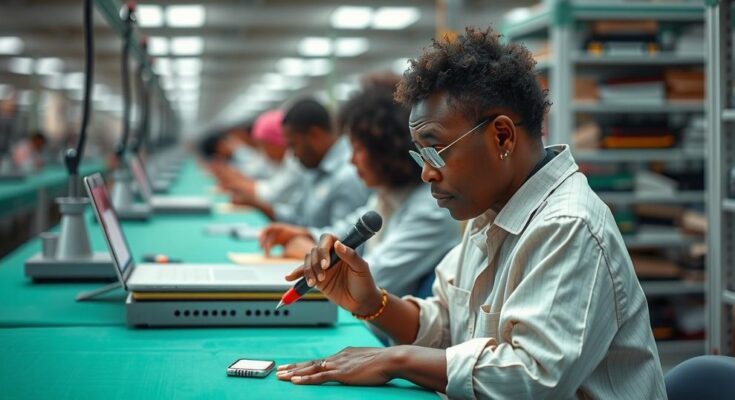International lawyers from the Democratic Republic of Congo have praised Apple’s decision to cease sourcing minerals from the region amid worsening conflicts; however, they are pressing forward with legal cases against the company in Europe, claiming complicity in the use of conflict minerals. Apple disputes these claims and has taken steps to ensure its supply chain maintains ethical standards, yet legal representatives stress the need for verification and accountability.
International lawyers representing the Democratic Republic of Congo have expressed approval concerning Apple Inc.’s recent decision to desist from sourcing certain minerals from the region due to escalating conflict. Despite this acknowledgment, legal representatives have affirmed their commitment to pursuing criminal litigation against Apple in Europe, particularly in France and Belgium. These actions come in light of complaints alleging that Apple’s subsidiaries have utilized conflict minerals sourced from Congo, which is known for its production of tin, tantalum, and tungsten—minerals integral to electronic devices. Reports indicate that some artisanal mines in Congo are controlled by armed groups implicated in severe human rights violations, including massacres and sexual violence.
Apple has publicly countered these allegations, asserting that it mandates its suppliers to refrain from sourcing such minerals from regions experiencing conflict, including Congo and Rwanda. Their official statement indicates a proactive approach to supplier management and improving mineral traceability. Yet, lawyers for Congo have emphasized the necessity of verifying these claims with empirical evidence from the region, asserting that Apple’s statements alone do not absolve it from past allegations of complicity in the utilization of conflict minerals. They now await judicial decisions from French and Belgian authorities regarding their claims.
As tensions continue to escalate in eastern Congo, driven by the competition for valuable minerals, the situation remains precarious. The conflict, exacerbated by armed groups, has resulted in extensive civilian suffering, with millions displaced since the 1990s. Apple contends that a significant portion of the minerals incorporated in its products are recycled, indicating a shift towards sustainable sourcing practices in response to these complex challenges. Nonetheless, the ramifications of international mineral trade amid conflict zones will require ongoing scrutiny and reform.
The Democratic Republic of Congo is a crucial source of tin, tantalum, and tungsten, collectively known as 3T minerals, which are essential components in the manufacturing of electronic devices like computers and smartphones. However, the mining sector has been marred by systemic violence and human rights abuses, often connected to armed groups that benefit from the lucrative mineral trade. International efforts have aimed at improving accountability and the traceability of minerals used by leading companies, but challenges remain. The recent legal actions against Apple underscore the complexities surrounding corporate responsibility in conflict-affected areas and highlight the need for meaningful changes in supply chain management.
In summary, while Apple Inc.’s recent decision to halt the procurement of conflict minerals from the Democratic Republic of Congo is a step towards ethical sourcing, it does not exempt the company from legal accountability concerning past practices. The ongoing legal proceedings in Europe serve to emphasize the need for comprehensive oversight and transparency in corporate supply chains operating in regions plagued by conflict and human rights violations. As the situation develops, continued vigilance and action from legal representatives and humanitarian organizations will be pivotal in addressing these significant issues.
Original Source: www.investing.com




